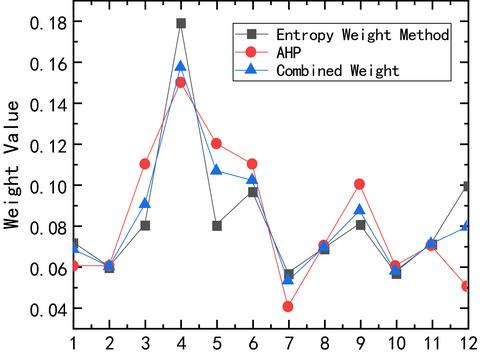当前位置:
X-MOL 学术
›
Energy Sci. Eng.
›
论文详情
Our official English website, www.x-mol.net, welcomes your
feedback! (Note: you will need to create a separate account there.)
Multi‐scenario comprehensive benefit evaluation model of a multi‐energy micro‐grid based on the matter‐element extension model
Energy Science & Engineering ( IF 3.5 ) Pub Date : 2020-10-26 , DOI: 10.1002/ese3.828 Hang Liu 1, 2 , Weijie Shen 1, 2 , Xinying He 1, 2 , Bo Zeng 1 , Yingxin Liu 1, 2 , Ming Zeng 1, 2 , Chaoyue Zhao 1
Energy Science & Engineering ( IF 3.5 ) Pub Date : 2020-10-26 , DOI: 10.1002/ese3.828 Hang Liu 1, 2 , Weijie Shen 1, 2 , Xinying He 1, 2 , Bo Zeng 1 , Yingxin Liu 1, 2 , Ming Zeng 1, 2 , Chaoyue Zhao 1
Affiliation

|
Integrated energy systems and multi‐energy micro‐grids are complex multi‐agent collaborative optimization projects. According to the operating structure and characteristics of the multi‐energy system, considering the externality, economy and other factors, a scientific and effective comprehensive evaluation are important decision supports to ensure its implementation and promote its development. Therefore, this paper proposes a comprehensive benefit evaluation model of a multi‐energy micro‐grid based on the matter‐element extension model. With the research trends and practical requirements of multi‐energy micro‐grid benefit evaluation, an evaluation index system covering energy efficiency indicators, economic indicators, reliability indicators, and renewable energy consumption indicators has been constructed, and uncertainties have been resolved in cloud model and fuzzy set theory. Based on the advantages of the performance evaluation information, the system operation scenarios in the process of planning scheme formation are fully considered, and then a matter‐element‐extensible multi‐attribute decision‐making model is proposed to evaluate the comprehensive benefits of multi‐energy micro‐grids. Finally, the feasibility of the above method is verified by comparing the comprehensive benefit evaluation results of the multi‐energy micro‐grid under different planning scenarios. In addition, a certain decision‐making reference is provided for the formation of a multi‐energy micro‐grid configuration scheme.
中文翻译:

基于物元扩展模型的多能源微电网多情景综合效益评价模型
集成能源系统和多能源微电网是复杂的多主体协同优化项目。根据多能源系统的运行结构和特点,考虑到外部性,经济性和其他因素,科学有效的综合评估是确保其实施和促进其发展的重要决策支持。因此,本文提出了一种基于物元扩展模型的多能源微电网综合效益评价模型。结合多能源微网效益评价的研究趋势和实际要求,构建了涵盖能源效率指标,经济指标,可靠性指标和可再生能源消耗指标的评价指标体系,云模型和模糊集理论解决了不确定性。基于绩效评估信息的优势,充分考虑了规划方案形成过程中的系统运行场景,提出了一种物元可扩展的多属性决策模型,对多方案的综合效益进行了评估。能源微电网。最后,通过比较不同规划场景下多能源微网的综合效益评价结果,验证了上述方法的可行性。此外,为多能量微电网配置方案的形成提供了一定的决策参考。充分考虑了规划方案形成过程中的系统运行场景,提出了一种物元可扩展的多属性决策模型,对多能源微电网的综合效益进行了评价。最后,通过比较不同规划场景下多能源微网的综合效益评价结果,验证了上述方法的可行性。另外,为多能量微电网配置方案的形成提供了一定的决策参考。充分考虑了规划方案形成过程中的系统运行场景,提出了一种物元可扩展的多属性决策模型,对多能源微电网的综合效益进行了评价。最后,通过比较不同规划场景下多能源微网的综合效益评价结果,验证了上述方法的可行性。另外,为多能量微电网配置方案的形成提供了一定的决策参考。通过比较不同规划场景下多能源微网的综合效益评价结果,验证了上述方法的可行性。另外,为多能量微电网配置方案的形成提供了一定的决策参考。通过比较不同规划场景下多能源微网的综合效益评价结果,验证了上述方法的可行性。另外,为多能量微电网配置方案的形成提供了一定的决策参考。
更新日期:2020-10-26
中文翻译:

基于物元扩展模型的多能源微电网多情景综合效益评价模型
集成能源系统和多能源微电网是复杂的多主体协同优化项目。根据多能源系统的运行结构和特点,考虑到外部性,经济性和其他因素,科学有效的综合评估是确保其实施和促进其发展的重要决策支持。因此,本文提出了一种基于物元扩展模型的多能源微电网综合效益评价模型。结合多能源微网效益评价的研究趋势和实际要求,构建了涵盖能源效率指标,经济指标,可靠性指标和可再生能源消耗指标的评价指标体系,云模型和模糊集理论解决了不确定性。基于绩效评估信息的优势,充分考虑了规划方案形成过程中的系统运行场景,提出了一种物元可扩展的多属性决策模型,对多方案的综合效益进行了评估。能源微电网。最后,通过比较不同规划场景下多能源微网的综合效益评价结果,验证了上述方法的可行性。此外,为多能量微电网配置方案的形成提供了一定的决策参考。充分考虑了规划方案形成过程中的系统运行场景,提出了一种物元可扩展的多属性决策模型,对多能源微电网的综合效益进行了评价。最后,通过比较不同规划场景下多能源微网的综合效益评价结果,验证了上述方法的可行性。另外,为多能量微电网配置方案的形成提供了一定的决策参考。充分考虑了规划方案形成过程中的系统运行场景,提出了一种物元可扩展的多属性决策模型,对多能源微电网的综合效益进行了评价。最后,通过比较不同规划场景下多能源微网的综合效益评价结果,验证了上述方法的可行性。另外,为多能量微电网配置方案的形成提供了一定的决策参考。通过比较不同规划场景下多能源微网的综合效益评价结果,验证了上述方法的可行性。另外,为多能量微电网配置方案的形成提供了一定的决策参考。通过比较不同规划场景下多能源微网的综合效益评价结果,验证了上述方法的可行性。另外,为多能量微电网配置方案的形成提供了一定的决策参考。









































 京公网安备 11010802027423号
京公网安备 11010802027423号